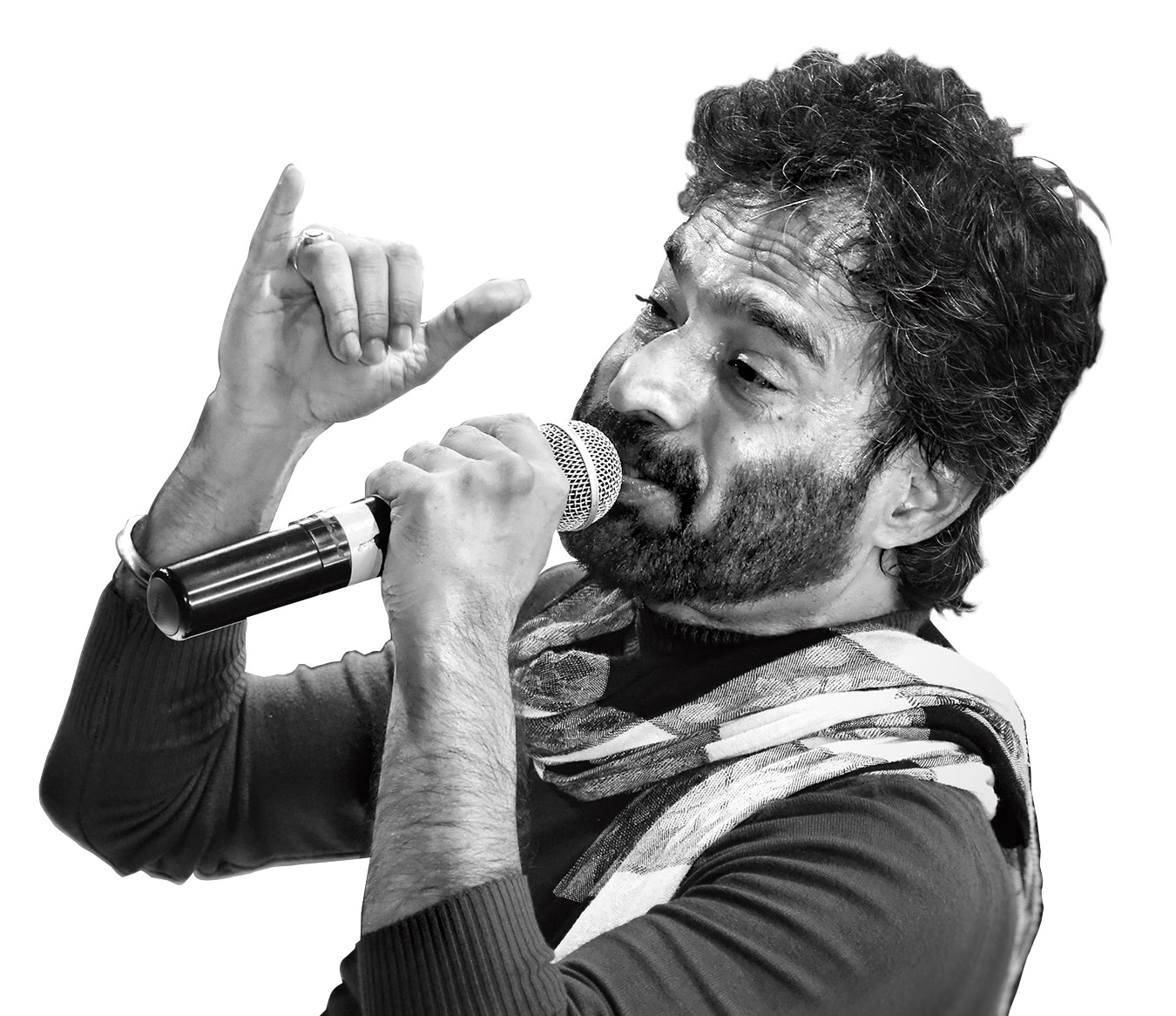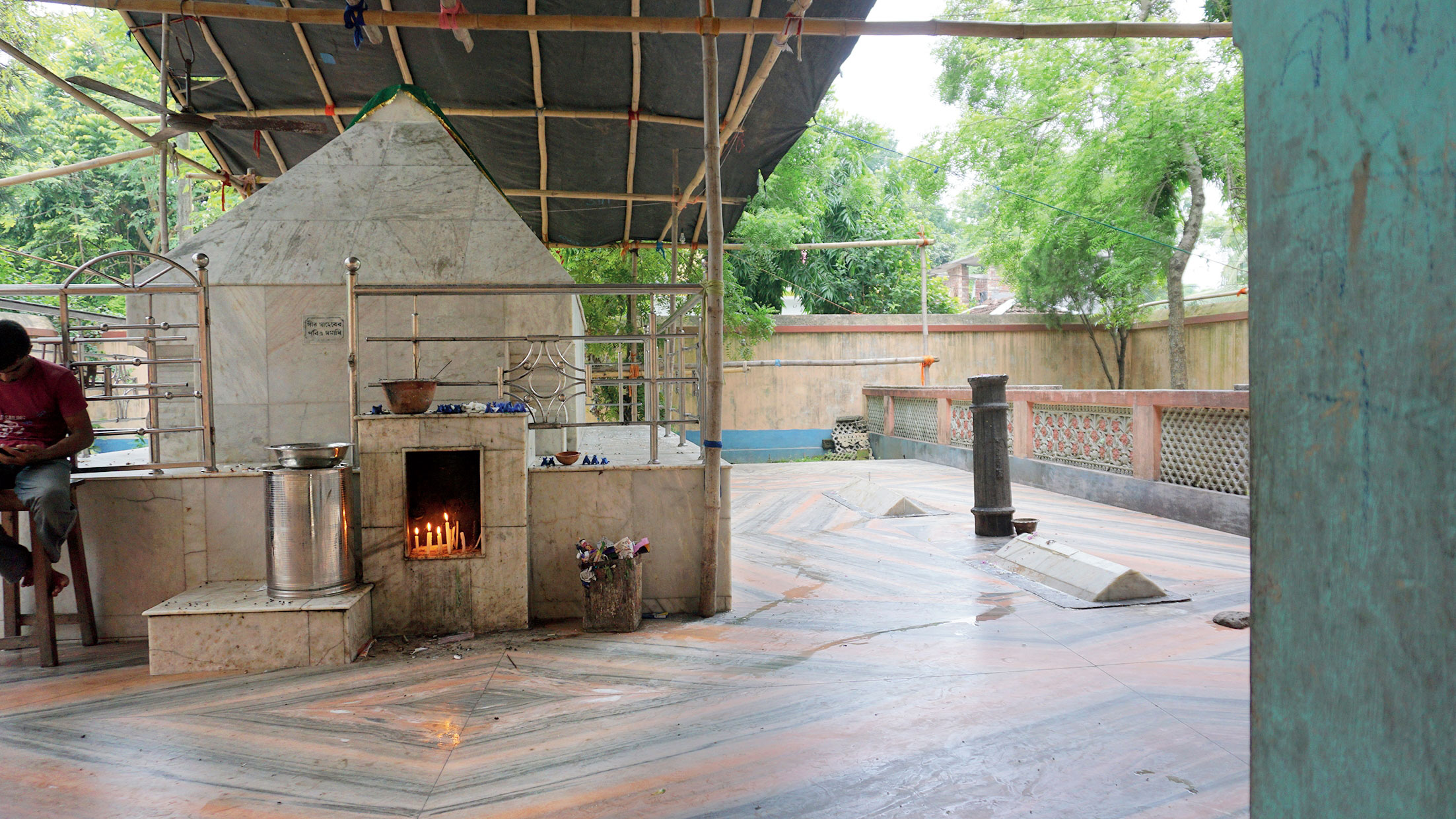Jara kheyechhen cut money/Dadara othoba Didimoni/Eshechhe shomoy gotimoy daant kelate kelate pherot din... If you have gorged on cut money/Brothers and Sister in harmony/The wind did turn, it’s end of fun/Return it all with a Cheshire grin. Cut money is a jugaad type coinage for extortion.
It is fair to say that Bengal chief minister Mamata Banerjee’s recent diktat to the Trinamul party workers and government officials about refunding “cut money” has not been nearly as well received as Nachiketa Chakraborty’s song about it. Which is why when I call him up seeking an appointment and he says he won’t talk about his newest song at all, I am surprised. “But I am always ready for a spot of adda,” comes the gruff rejoinder, and before I know there is a different voice at the other end rattling away assiduous directions to an address in north Calcutta.
Nachiketa is not a man. He is an epoch of Bangla gaan. He is, for a certain generation, a synonym for youth and change. He is, perhaps most importantly, a grammar of protest. The grammar that makes protest accessible. No, he is not a Mohiner ghora. He is not Suman Chattopadhyay. He is not a baul. And he is not a T.M. Krishna either. Nachiketa is Nachiketa.
I have seen him on stage. Face full of scruffy hair. A mop on his head. The savannahs peeping over his round-necked vest — reinforcing some stereotype of aam machismo. He flicks a side of his jacket like a nervous twitch. Trailing whimsical scarf. Dark glasses on. Head band. The black thread around his neck, talismanic. He is an electron with microphone in hand, charged, bounding up and down the stage. Talking songs. Singing life. Turning to the musicians backstage with sharp requests — “C minor!” Running his fingers through his hair. Teasing the audience — “This song is for all you domesticated husbands” or “If you are a corrupt doctor, this one is for you.” Completely aware of the melting point of his smiles. Exuding unmitigated swag. And that voice — slightly nasal, generous, perched on a bedrock of jagged wit, spinning stark colloquialisms, infecting the listener’s nerves with its raw irritant anger.
That is why when I peep through the half open front door of the highrise apartment, I miss the lean figure on the single corner settee — cloaked in silence, arms gathered on lap, one leg over another, facing a verandah overlooking a lush field, a canal and a train track.
After the release of Cut Money, the song, Bengal has been rife with speculation. Did Nachiketa sing out in criticism of Mamata Banerjee? Who is the Didimoni he is referring to? It didn’t help that singer-turned-MP Babul Supriyo tweeted “countless thanks” to “Nachiketada” for the number. Some are saying this is a sure sign that Nachiketa will soon be joining the Bharatiya Janata Party.
The reason why it is such a big deal is because Nachiketa is said to be a diehard supporter of Banerjee and the Trinamul. Dial back. October 2009. Foundation stone-laying ceremony of a railway indoor stadium. Nachiketa is there. Banerjee is the railway minister. November 2009. Sonachura (Nandigram). Rally post general elections. Banerjee arrives with Union minister Sisir Adhikari and Nachiketa. Nachiketa is a fixture on stage on July 21, which the Trinamul celebrates as Shahid Divas. 2011 Assembly elections. Star campaigner. Nachiketa. An April 2011 report in The Telegraph on a rally in Hooghly’s Arambagh reads: “At the beginning of the rally, Nachiketa sang a song penned by Mamata: “Phiriye dao moner shanti… Give us back our peace of mind.” The Pariborton Chai posters of the Trinamul had Nachiketa’s face in that gaggle of intellectuals from Bengal. But naturally some would like to think this song is more than a song, that it is the ultimate detraction, a sure sign of a greater unravelling of the chief minister.
Nachiketa is aware of the buzz and annoyed by it. He tells me, “Everyone wants sensation. Keu logic khonje na. Magic khonje… No one is interested in logic. Everyone is running after magic.” He continues, “Have you ever heard a political leader tell his or her party workers to clean up, return ill-gotten gains? I haven’t and I am applauding Mamata Banerjee. I am amplifying what she said. Why is this so difficult to understand? Have you heard that part of the song where I say — Ekta kandhete bonduk rekhe/ Chhurchhen gooli bohudin (Meaning: You lot have been shooting from someone’s shoulder for much too long)? Well, that shoulder is Mamata Banerjee’s. I am saying in no uncertain terms that those who have made money using illegal means have no credibility themselves; they have taken Mamata Banerjee’s name in vain, misused her image.”
By now the silence has fallen away, as has his original resolve. Nachiketa is bounding across the room hospitably. Water. Bhalo mishti. Milk tea? Ektu green tea? We talk about his career beginnings in the early 1990s, a time when Bengali film music was at its least scintillating. A Bangla band or two were twinkling in the cultural firmament, but musically speaking, the Bengali had not much to identify with, take pride in. That is when he burst on to the scene, he and Suman Chattopadhyay and Pratul Mukhopadhyay.
Nachiketa sang of first love (Nilanjana), of old age homes (Briddhasrom), criticised doctors, government servants, astrologers, he spoke about illicit love. He also made fun of ministers and the political system in songs such as Toke montri banabo, where a father tells his son — “You must be a minister when you grow up. That way your children’s children can take it easy.”
His mentor those days was the late Subhas Chakraborty, who was then minister in the Left Front government. Says Nachiketa, “A friend had introduced us and he took a liking to me. Sometime in early 1993 he asked me to sing two songs at the Gangotsav in Calcutta. That day the audience would not let me get off the stage. I had to sing nine songs.”
Nachiketa started to do shows all over Bengal, big cities, small towns. He tells me how after his mother died, a fan brought him some home-cooked alu posto to a show; she had read that he liked the dish which his mother would cook for him. He smiles fondly, “Even recently someone got me mochar ghonto.” In the last 20 years, he has also done shows in the United States, the United Kingdom, the Middle East.
Wooooo wooo. A train passes many floors below, beyond the field. We are now talking about Bangla music, the new generation. Nachiketa is known to mentor talent. It is said he is always willing to guide newcomers. I ask him if he has spotted a Nachiketa yet, and he says he finds any kind of typecasting or comparison odious. His Nachiketa response: “Keu khorgosh, keu shojaru. Ami shojaru.” Meaning, someone will be a rabbit, someone will be a porcupine. I am a porcupine.
The green tea arrives. He is back to reminiscing about Subhas Chakraborty. “When I took a jibe at ministers, he would laugh the loudest. He was a man ahead of his times; all for freedom of artistic expression. But that was just him. Mind you, for the longest time I was not allowed to perform in the SFI-dominated colleges. And when I spoke up in reaction to Nandigram, many needled him saying his protege had turned against his party. But he understood my need to speak up, he respected it.” Nachiketa’s expression now softens. He says, “For as long as he lived I did not say pariborton chai.”
But such close proximity to powerful politicians — hasn’t it compromised his artiste’s image, diluted his protest, confused his fans about his political beliefs? Replies the singer, “I have been asked to contest elections six times. It was even reported that I would contest against Buddhadeb Bhattacharjee. But I do not believe in parliamentary democracy. I am a true Communist. I am a Marxist and a private Marxist at that. Not like the CPI(M). And yes, I adore Mamata Banerjee for the human being she is. She is my Didi.”
Absent-mindedly, he tugs at the first drawer of the bedside table, brings out a used envelope and hands it to me. “Turn it around,” he instructs. I do and find he has scribbled the Cut Money song on it in blue ballpoint pen. He drops it into the drawer with a wry smile and I ask if a song has now driven a wedge between two friends. “It shouldn’t,” he says. Then adds, “It won’t because we have been in touch.”
Another train passes; its raucous whistle floats up so many floors. Nachiketa’s voice has to climb over it to be heard. He says, “People have to be slightly more discerning. You know even MPs assumed, without even listening to the song, that I am going to join the BJP. I don’t believe in dharmiyo rajneeti… religious politics. You cannot run the country by polarising its people.”
And the song goes: Etodin jara koreche selam/Bhoy kete geche badhyo golam/Ekhon tader uthbe proshno/Uttor aache ki?… Those who saluted till now/Quaked in fear, and how/ They are now beginning to ask, why/Hope you have a fitting reply. Jha jhang jha jhang jhang.
têtevitae
- 1964: Nachiketa is born in Calcutta to Sabharanjan and Latika Chakraborty Graduates from Maharaja Manindra Chandra College Originally a ghazal singer, his first song is Calcutta 300. It is said Salil Chowdhury refused to use his voice for the tele-serial, Charitraheen, in the early 1990s
- 1993: Gets his first break; comes out with his first solo album Ei Besh Bhalo Achi. Some others are Dolchhut and Ekla Choltey Hoy
- The term ‘jibonmukhi gaan’, meaning lifesong, which later becomes the descriptor for a certain genre of music, is used by HMV for one of his initial cassettes. By the late 1990s, starts doing playback for Bengali films — the latest such work being Srijit Mukherji’s 2016 thriller Zulfiqar
- 1998: One of his first films as music director is Hothat Brishti
- Has six platinum discs
- Is now writing short stories in a genre he describes as ‘dark fantasy’. Bipojjonok Baro is released in 2018, and Bipojjonok Aaro in 2019











